Marcus Aurelius, The Philosopher
Posted on: December 22, 2013
- In: Books | Politics | Society | Thoughts
- Leave a Comment
“If you are distressed by anything external, the pain is not due to the thing itself, but to your estimate of it; and this you have the power to revoke at any moment.” – Marcus Aurelius
Marcus Aurelius was a Roman Emperor. I know what you are thinking. You probably imagine the guy as tough and muscular, merciless and power-hungry. I mean come on the man commanded armies for god’s sake! He wielded enormous power. But we would be mistaken to ignorantly succumb to these suspicions without first verifying whether they are indeed true. I could do this here, present the research of what numerous scholars have said about his manners and actions, but that is not exactly what I had in mind to talk about with you today. If you really do want to know whether he conforms to the stereotypes you happen to have of Roman emperors, please go and read a biography of him written by some lad or gal with a PhD. That would do the trick.
I will say one thing though, he was certainly no numbskull. Just because he was an army-man who enjoyed a good fight, he also was quite the philosopher. That is, he was not only a doer but also a thinker. The world, I believe, needs more people like Marcus, people who are not afraid to act and change the world but people who are also wise enough to realize that the mind is often significantly more powerful than the sword. The mind liberates us from the material world, frees us from sense-experience. It is with the mind that we reflect, deliberate, draw connections between things, etc. I can only go so far in trying to understand Marcus’s mind. I would do a better job at looking at my own mind, wouldn’t I? I think so.
The quote above was inserted for a reason. I didn’t just put it there for decorative purposes or to make my text sound intelligent. I just wanted to make this clear in case some of you were beginning to think I forgot about it or if you may not see the relevance of it to what I am saying. Patience, reader, patience.
Do not be distressed by things external to you, he says. Do not let people or objects in the world determine how you feel. You are not their slave. They cannot make you feel pain. You alone wield the power to command your emotions. His ideas are truly liberating, are they not? Our minds belong to us, and us alone. There is an element of detachment here. I do not deny that we as human beings naturally must participate in society, but we must first and foremost appreciate our personhood. We must take control of ourselves and not unwillingly subject ourselves to outside forces.
I do not know whether I totally agree with Marcus. I would be curious to see what he has to say about love. When we are in love, do we not become selfless? Do we not lose ourselves in another person? In doing so, do not our defences and barriers break down? How can someone be in love if they remain detached? Perhaps if both lovers share the same form of detachment and follow Marcus’s philosophy faithfully it could work out. But the majority of relationships require a strong emotional bond between two partners.
I could think of other things to say but I will leave it at that for now. I encourage you to read Marcus Aurelius’s Meditations. It is a fascinating and unforgettable book.


Leave a comment